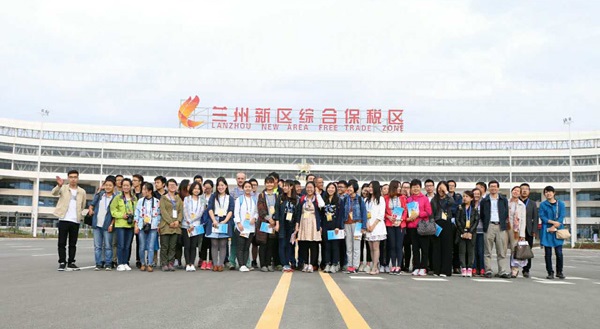News
Lanzhou's march into the global economy
Updated: 2016-09-22By Tyler Terrance O'Neil ( chinadaily.com.cn )
|
 |
|
An undated?group photo of the Long March Press Tour troop in Lanzhou. [Photo by Zhang Bo/for chinadaily.com.cn] |
Fancy a Kindle? Take the Long March quiz
This wasn't the Lanzhou I remembered at all.
Our Long March Press Tour troop transport drove along a wide, smooth avenue, flanked on either side by skinny trees and brand new buildings. As we pulled into the industrial park, I couldn't help but notice the fresh paint and pristine pavement. This is a dramatically different city from the one I remember.
When I visited in 2011, I rode on bumpy streets to a worn out little restaurant for a bowl of the city's famous beef noodles. My group then visited the Iron Bridge before jumping aboard rafts made of inflated sheep's skin to float down the Yellow River. It was a vastly different experience.
However, in China where skyscrapers can be built in two weeks or a train can take you from one city to the next faster than an airplane, speed and change are reoccurring themes. I shouldn't be surprised by Lanzhou's changes, as I've seen it before.
I lived in Shijiazhuang several years ago, and while the capital of Hebei province used to be one of the most polluted cities in China, my friends who still live there say there are now many more blue sky days. The areas that were once massive construction sites are now even more massive shopping complexes — with infinitely more Starbucks' locations than when I was there.
I saw Chongqing change in the few years I lived there, filling out as the massive city it was intended to be. Even in Beijing, I feel as though whole sections of the city can change every season.
So what is Lanzhou's motivation for change? Well, as a central point along China's Belt and Road Initiative, there is a lot to be gained from facilitating trade between China and areas to the west. To that end, the city has invested in economic projects such as the 3.5-billion-yuan Lanzhou New Area Free Trade Zone. Opened in 2014, this trade hub has massive amounts of transport infrastructure built into it, allowing it to take full advantage of the dozens of major highways and railroads that pass through the city. With huge spaces available for rent and juicy tax incentives, Lanzhou hopes to draw companies from around the world to use the space as a distribution point.
My concern, however, is whether it will work. Those new buildings I saw were mostly empty. Everything looked new and sharp in part because it wasn't yet in use. While at the free trade zone, my platoon of journalists were the only people shopping there. We were even able to stand in the middle of a six-lane entryway to the area to take a picture without needing to worry about car or truck zooming by us. If Lanzhou is going to grow in that way, it's going to need businesses, goods, and people to fill their amazing new buildings.
Parts of Lanzhou remain how I remember, and one of our guides said I can still go ride a sheepskin raft if I'm so inclined, but the city is trying to build on what it's brand can be. Chinese economic planners believe that Lanzhou is sitting in a prime location for overland trade, and it could regain the prominence it had with the ancient Silk Road. I hope that comes into fruition soon, but the one thing that shouldn't change are those delicious noodles.
 |
|
A maximum of four people can ride one sheepskin raft down the river. In Gansu province's Jingtai county, traditional rafts are created by the traditional method. Today the rafts are most commonly used to take tourists on picturesque 30 minute cruises down the Yellow River. [Photo/Crienglish] |


